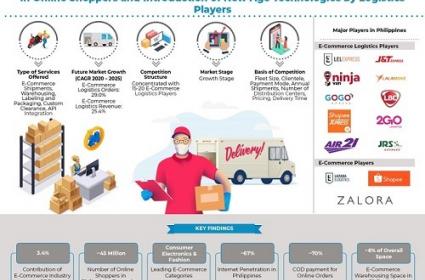Philippines E-Commerce Logistics Market Outlook to 2025: Ken Research

The report titled “Philippines E-Commerce Logistics Market Outlook to 2025 - Driven by Growth in Internet Penetration along with Introduction of New Age Technologies by Logistics Players" provides a comprehensive analysis of e-commerce logistics services in the Philippines. The report covers various aspects including the market size (by number of orders and revenue), industry cycle, timeline, market segmentation by channel (e-commerce merchants and 3PL companies), by domestic and international shipments, by area of delivery (intercity and intracity), by mode (air and ground shipments), by delivery period duration (same day delivery, 1-2 day delivery, 3-4 day delivery and more than 4 day delivery), by type of products, by payment mode (cash on delivery, credit cards and others) and by return rate. The report also focuses on e-commerce logistics warehousing sector (warehousing clusters, space, rentals, technology, cost component analysis, etc.) in Philippines. Moreover, the report also covers the overall competitive landscape and growth drivers and trends and government role and regulations. The report concludes with market projection for future for the market, Covid-19 impact, analysts’ take on the future and case studies highlighting the major opportunities.
Philippines E-Commerce Logistics Market Overview and Size
The Filipino E-commerce industry has witnessed a moderate rise over the past 5-6 years with an increase in internet penetration into the country. Escalation in the number of smart phones in the country, fast-growing middle-class population, high consumer confidence, changing consumer preferences, etc. has augmented the growth of e-commerce leading surging demand for e-commerce logistics as well in the country. Manila and some other cities including Central Quezon City, Cebu and Davao have emerged as the key hub for demand and supply of e-commerce logistics The COVID-19 pandemic has also pushed the demand in the market as the need for social distancing has forced people to rely on online shopping. The growth in the E-commerce orders for logistics has been majorly driven with an increase in internet affinity and demand for value added services.
Philippines E-Commerce Logistics Market Segmentations
By Channel: In terms of total number of shipments, 3PL players have captured the majority of the market share as big marketplaces like Lazada and Shopee are also dependent on these players for the last mile deliveries in 2020. International e-commerce companies prefer to outsource logistics to 3PL companies to avoid the hustle of establishing their own operations.
By Delivery Period: 1-3 day delivery has dominated the market in terms of number of orders owing to increasing focus of the companies on providing better services coupled with increasing customer needs for better service. Moreover, majority of the orders are placed from the Luzon area (mainly Metro Manila), where the products can be delivered within this time duration.
By Type of Products: Consumer electronics and fashion & accessories have dominated the online retail sector in Philippines in 2020. Beauty and personal care is the third leading e-commerce category in Philippines.
E-Commerce Warehousing Sector in Philippines:
The warehousing market in the Philippines is still in the growing phase where majority of the domestic companies are operating through their own in-house operations and are less focused towards out-sourcing it to 3PL companies.
E-Commerce warehousing has captured ~6% of the overall warehousing space in Philippines. The rise of e-commerce within the country has given a major boost to the warehousing market. For instance, Lazada plans to add warehouses in the country in the next 3-5 years. Most of the e-commerce logistics players have their owned warehousing space in order to manage all the operations by themselves. E-commerce companies in Philippines generally prefer to own their warehouses in the top tier cities & outsource the warehousing requirements to e-com logistics companies in provincial areas. For last mile hubs, companies either set up their own branches or partner with the existing malls or retail outlets as a pickup and drop facility.
Competitive Landscape of Philippines E-Commerce Logistics Market:
The competition in the e-commerce logistics space in Philippines is highly concentrated whereby major 4-5 companies hold the majority of the share in the market. The major e-commerce logistics companies include LEL Express, J&T Express, NinjaVan, Lalamove, Entrego, GoGo Xpress, LBC Express, Shopee Xpress, 2GO Xpress, Air21, JRS Express and few others. The e-commerce market is also highly fragmented as the majority of the market share is composed by the top 3-4 players. Fleet size, number of orders, clientele, number of delivery centers, value-added services, price, and delivery time are the key competing parameters for the e-commerce logistics providers.
Philippines E-Commerce Logistics Market Future Outlook and Projections
Over the forecast period, Philippines E-commerce logistics market is expected to drive up the demand because of expected surge in internet penetration, especially its exposure to the youth. Due to the COVID-19 outbreak, there has been a shift from offline sales to online sales, which is expected to ensure substantial growth in the future as well. The e-commerce logistics market in the country is expected to grow on the back of new technologies such as Automation, Blockchain, and the Internet of Things, which will be explored to increase efficiency, improve customer experience and enhance service quality.


















